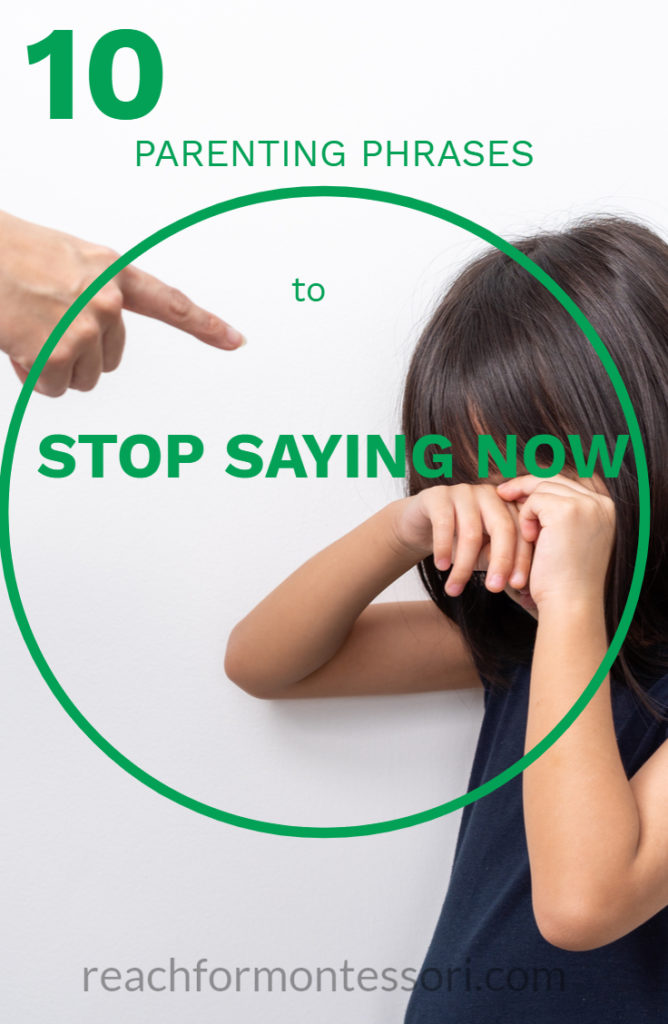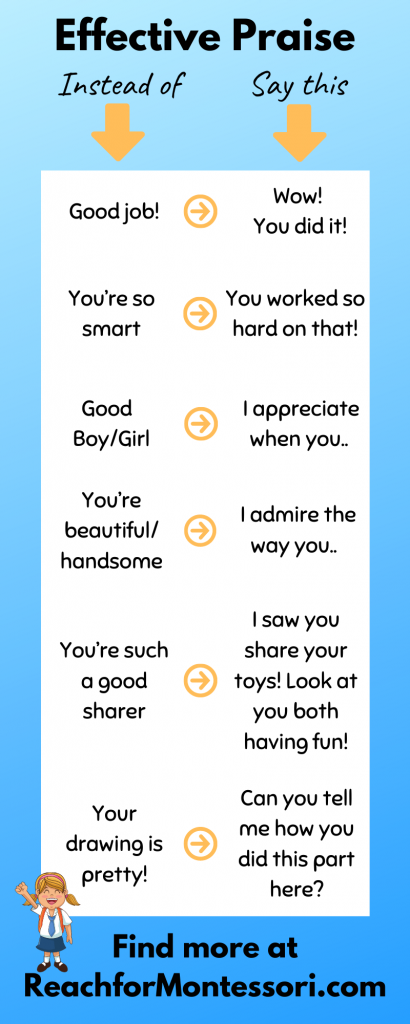As parents, we are always looking to do right for our children. It is easy to get caught up in the moment though and revert to repeating phrases we heard as children, or that we have heard other parents say.
When we slow down, step back and listen to ourselves speak to our kids, it's easy to find parenting phrases we should stop saying.

No!
I know what you are thinking. There isn't a parent in the world who hasn't given their child this simple, one-word command.
Situation: Your child is petting the family dog and she excitedly pulls the dog's ear. You sternly say, “No!“, pull the child away from the dog, and tell your child that it was not good to do.
So, what's the problem?
Stopping your child from the behavior and telling them “no” isn't the problem in this situation. What didn't happen is the problem.
Young children are sponges and only teaching them what is wrong is an opportunity missed. You can help them develop reasoning skills they will carry throughout their lives by giving them the reason for the command.
Alternative response: Stop the behavior and move your child away from the animal. “When you pull her ears it hurts her. Let's practice a nice, gentle way to pet her that makes her feel good.“
There is nothing wrong with the word, “no“, as long as it is followed up with redirection or a suggestion for more appropriate behavior or activity and the reasoning behind the “no“.
Don't worry
Kids develop, then move past, many worries and fears throughout early childhood. These fears are normal and sometimes even healthy.
Telling a child not to worry:
- is dismissive
- does not stop them from worrying
Instead, attempt to figure out exactly what your child's concerns are and what you can do to help them; not solve their problems, just help them come up with some ways to cope.
Why did you do that?
Children make interesting behavior choices. It's a natural thing for us to want to know why our child has done something, whether it is biting/hitting, ripping a book, or coloring on a wall.
The problem with asking young children why they did something inappropriate is that they are still learning how to identify their emotions and connect them to appropriate behaviors.
Therefore, they are not likely to have an answer for you, making your question only a frustration added to the frenzy of emotions they are already experiencing.
Alternative: Consider a possible connection between your child's behavior and a previous incident. “You couldn't wear your favorite shirt because it was washing. That was upsetting to you. Is that why you ripped the page?“.
When the emotional intelligence and vocabulary to express themselves effectively have developed in a child, it's likely you will see a decrease in reactive behaviors that don't make sense to you.
You're ok
Whether a gets hurt physically or is experiencing emotional distress, telling a child they're ok is not ideal. You are telling them how they feel instead of asking them.
“You're ok” is dismissive and does not address the reason your child is upset. This is not a phrase adults appreciate hearing and children deserve to have their feeling considered, as well.
Good Job
Another common phrase parents say to their children, is “good job“. However wonderful the product of your child's efforts is, the phrase “good job” emphasizes the finished product rather than the concentration and hard work.
A growth mindset is important for parents to encourage.
You are smart

Receiving effective praise is important for a child's development.
We need to recognize the harm in putting this fixed label on our children, though.
Again, the encouraging effort is what is lacking in this phrase.
Calling a child smart implies they are “good at thinking” and discourages effort in areas where they may not excel.
You are making me upset/sad
As parents, our feelings are often swept to the side in favor of everyone else's. This can be frustrating.
It's important, however, to not place responsibility for our feelings on our children.
From this list of parenting phrases we should stop saying, this is the one that may take a little introspection to address.
You are being bad
This phrase is one of the most important parenting phrases to stop saying. Kids make bad choices sometimes, just like adults.
The choice being a bad one doesn't mean that the child is bad, even for the moment.
“Bad” is a negative and potentially long-lasting label that can damage a child's self-worth and impact behavior long-term.
This is not how 4 year old's act/Act like a big boy
Maturity comes with age and emotional support and there are many reasons children act younger than we'd expect.
Telling a young child they are not acting their age not only dismisses the reason for their behavior but is also a form of shaming.
Situation: Your preschooler is crawling even though he's been able to walk for years.
Alternative response: “You've been crawling instead of walking this afternoon. Little babies spend a lot of in their mommy's arms. Do you feel like you need some extra snuggles?“.
I don't know/Maybe later
In an attempt to squash the repetitive questions and delay the inevitable meltdown, we tell our children “I don't know” or “maybe later“, when we do actually know what our answer is going to be.
Children deserve honesty and respect. It's best to be upfront with them if you are not going to do something they are requesting, then help them through their feeling right then and there.
While delaying the inevitable might relieve your stress temporarily, your child may be spending hours excitedly waiting for something.
The disappointment could very well be greater for them after the time waiting.
Whether we follow a Montessori philosophy and think of ourselves as gentle parents or not, there is always room for improvement in how we speak to our children.
Do you have any suggestions for parenting phrases we should stop saying?
Cheers and don't forget to subscribe!

Another one we avoid is “be careful!”… Did you know that parents are 4 times more likely to day this phrase to girls that boys? It’s such a useless phrase for any gender… We try to be specific and say things like “how close are you to that edge?” Or “what will happen if you swing that stick?” Or if we see dangerous behaviour we offer an alternative and explain why. By not saying be careful, it forces us to stop and think. Is there even a need for careful? Does my child need to be removed from the situation or are they learning to test their own limits?
That really is a great parenting phrase to avoid!